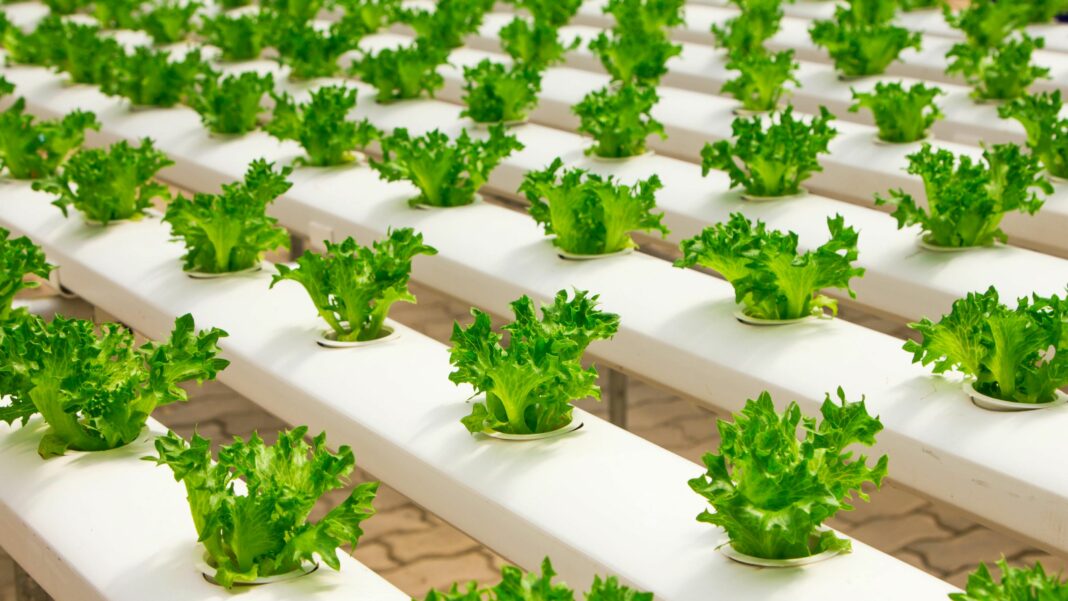Ever heard of farming in the desert without irrigation? Maybe watering crops with desalinated ocean water? Or growing vegetables on the sides of cliffs and city roofs? Using hydroponic and aquaponic technology, plants can grow anywhere (indoors, of course) and with little need for space. With some nutrients added, water tanks and fish tanks can grow plants as effectively as the largest farms and greenhouses. These innovative systems yield produce year-round with minimal environmental impact. (Plus, there are no weeds!)
Hydroponic systems are a soilless form of agriculture where plants are suspended in tanks of water. Water-rich produce such as tomatoes, cucumbers, bell peppers, celery, and strawberries, as well as leafy greens, thrive in hydroponic systems. By providing essential nutrients directly to the plant roots, hydroponic systems promote faster growth and higher yields compared to traditional soil-based farming methods.
Aquaponics takes the concept of hydroponics a step further by integrating fish into the farming process. The nutrients in fish excrement serve as a natural fertilizer for the plants, and in return, the plants filter the water to keep the fish happy and healthy. Aquaponic systems are a bit larger as they require fish tanks but work as a method for farming fish and plants at the same time.
Both hydroponic and aquaponic systems are water-intensive to set up, but once they are running, the water is cycled back into the tanks. Ponics systems, therefore, do not require water throughout an entire growing season, reducing the impact on local aquifers and waterways.
These systems stack easily, resulting in farms that take up more vertical than horizontal space. In crowded areas like Brooklyn, ponics have a clear advantage over traditional agriculture. And investors are pouring in. The New York Times reported $929 million invested into U.S. indoor-farming ventures in 2020 alone.
But what does a future of produce without soil mean? Some hydroponically-grown produce that is classified as “organic” are getting pushback. USDA Organic certifications are given to farms that have dedicated years to creating healthy soil. But if all the nutrients are added to hydroponics systems (often chemically) can their produce really be organic? Critics of ponics systems insist that nothing can replicate the nutritional value of farm-fresh produce.
Ponics are an experiment in the future of growing. A warming world needs agricultural technology to withstand a harsh climate, but, as some critics argue, people need food grown in soil and sun.
Brooklyn’s urban farmers are on top of these new technologies — and are doing more with it than you’d imagine. Gotham Greens, Farm.One, and Oko Farms have adopted ponics, transforming abandoned warehouses and underutilized rooftops into thriving urban farms.
Gotham Greens: Gotham Greens grows food on over 95,000 square feet of New York City rooftops. Founded in Brooklyn, the company now operates across the U.S., selling its hydroponically-grown leafy greens across the country. Gotham Greens’s greenhouses are optimized for sustainability — many are solar-powered, low waste, and pesticide-free. And in an attempt to reduce food miles, their grown produce goes directly to local grocers.
Farm.One: Farm.One takes the concept of vertical farming seriously. Their Prospect Heights location offers tours of shelves upon shelves of hydroponic systems. Farm.One grows rare herbs, edible flowers, microgreens, and more. Produce is directly given to grocers on the day of picking, and patrons can visit their store to purchase freshly harvested greens. They also teach classes on hydroponics, for any home-growers who want to get their thumbs green.
OkO Farms: On River Street in Williamsburg, OkO Farms has an outdoor aquaponics farm with fish ponds and growing greens nestled against the East River. Dedicated to promoting food justice and environmental sustainability, Oko Farms specializes in aquaponic farming and education. Through community-based programs and workshops, Oko Farms empowers individuals to cultivate their fresh produce using aquaponic systems. The farm hosts a weekly farmer’s market during the summer where they sell their produce to support the mission of encouraging sustainable food systems.



First time, a discovery that I was totally unaware of. What a great site. So interesting and informative. Thank you.